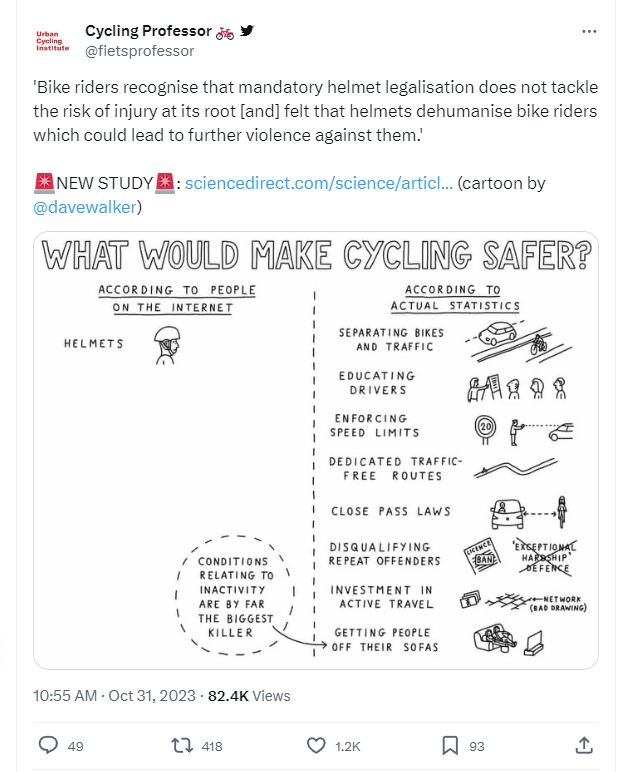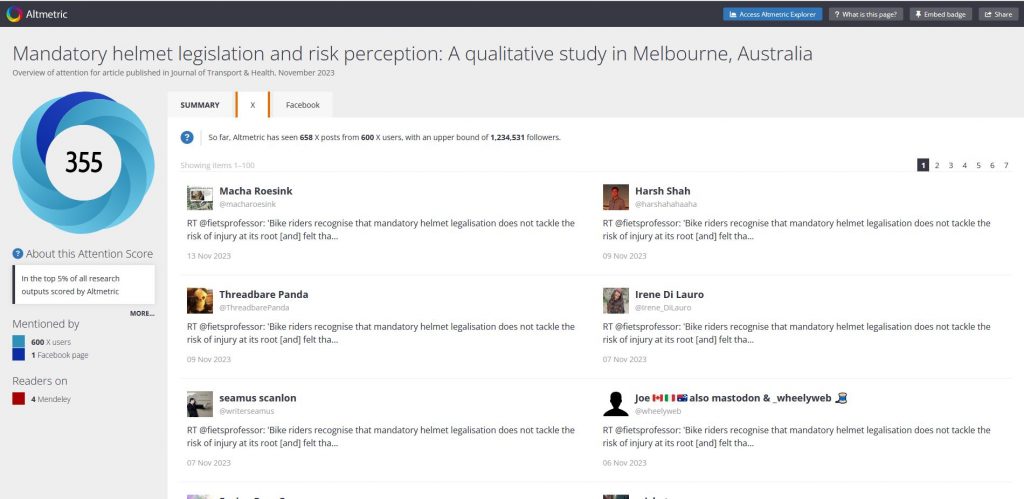Yes, it happened again. Cycling Twitter has just gotten a new favorite study (“Mandatory helmet legislation and risk perception: A qualitative study in Melbourne, Australia”). The study authored by a single author reports the results of semi-structured interviews with 21 bike riders from Melbourne, Australia. “The survey was advertised on Twitter, Reddit and around Melbourne through print media.” However, “…most interviewees were recruited from Twitter.”
“A topic guide was developed which acted as a starting point for the first interview. … After each interview the transcript was analysed and the topic guide updated with new questions that had arisen from the interview and the subsequent analysis.” These questions are available in the article’s Appendices A and B.
The author identified four themes and offered several quotes for each theme. The themes were:
-
- Judgement and victim blaming
- Violence from drivers of motor vehicles
- Australian cycling context
- Political pressure to individualize risk
Among quotes within the third theme, there was one addressing a possibility that helmet wearing leads to dehumanization.

This helmets-lead-to-dehumanization topic appears to be one of the main results of this paper:
-
- The author writes in discussion: “Interviewees were also concerned about helmets removing the human association from bike riders. This is consistent with previous literature (Delbosc et al., 2019; Limb and Collyer, 2023); if bike riding while wearing helmets contributes to the dehumanisation of bike riders then mandating helmets therefore contribute to violence against bike riders.”
- The last sentence in the paper: “Interviewees were concerned that wearing a helmet made them appear less human to drivers of motor vehicles which in turn could beget further violence against them.”
- The last point in Highlights: “Interviewees felt that bicycle helmets dehumanise bike riders which could lead to further violence against them.”
For a careful reader it becomes unclear how is it possible that one quote, which is only one example within one of the identified four themes, deserved to be one of the main findings and conclusions of this study. As I see it, there are several problematic issues:
-
- Only one person mentioned it? It is unclear whether only one person mentioned this helmets-lead-to-dehumanization issue. I asked the author on Twitter, but she has not yet responded. If indeed only one person mentioned this issue, it is questionable whether it deserves to be one of the main findings and conclusions of this study.
- Who is concerned? If we carefully read the quote, it is unclear whether (i) this person is aware that some people are concerned that helmets dehumanize them or (ii) whether this person explicitly said that she feels that her helmet dehumanizes her in the eyes of motor vehicle drivers. In my view, there is a huge difference as it hopefully becomes clear in my next point.
- “Most interviewees were recruited from Twitter.” The author transparently acknowledged limitations of the study regarding participants recruitment: “Selection bias is likely as most interviewees were recruited from Twitter and chose to engage with the study and might hold stronger opinions on the subject than most.” Knowing that another famous Australian study (“Dehumanization of cyclists predicts self-reported aggressive behaviour toward them: A pilot study”) was endlessly shared on cycling Twitter, it is quite possible that “Sheila” has read somewhere on Twitter or cycling blogs (e.g., StreetsBlogUSA) about this study, which speculated that “Mandatory helmet laws in Australia mean that hair and faces are more obscured; this may be contributing to dehumanizing beliefs.” (Please note that another Australian study “The effect of safety attire on perceptions of cyclist dehumanisation” appeared online after the interviews had been performed)
Surprisingly or not, Cycling professor with more than one hundred of thousands of followers on Twitter decided to tell the world that a new study shows that ” ‘Bike riders recognise that mandatory helmet legalisation does not tackle the risk of injury at its root [and] felt that helmets dehumanise bike riders which could lead to further violence against them.’ ”

The irony here, that the cycling professor seems to be unaware of, is that he shared a meme that argues that people on the internet have beliefs that contradict real science, while sharing the study based on interviews with people recruited from the very same internet (i.e., cycling Twitter). This is hilarious in my view. And tragic at the same time.
In conclusion, I ask you to think whether the study provided enough information that “the participants (!) felt (!) that helmets dehumanise bike riders which could lead to further violence against them”? Does this study deserve to be endlessly shared with the message “bike riders feel that helmets dehumanize them”?
Please note that it is possible that each and every one of 21 interviewed bike riders reported that they felt wearing a helmet dehumanize them, but the author failed to mentioned it. Regardless of that, it is once again proven that some people uncritically share scientific studies that support their agenda. I will leave it to you to judge what are the proportions of people who:
-
- …do not read a study and share only the message that supports their preconceptions
- …read a study, but are unable to understand it, and share only the message that supports their preconceptions
- …read a study, understand the seriousness of methodological limitations and problematic conclusions, but nevertheless knowingly share the message that supports their preconceptions and mislead their followers
Thank you for reading. If you spot a mistake in my understanding of this study or in my argumentation, please let me know. I will correct the text.
An update on 17.11.2023. Below you can see how often the study and the cycling professor’s tweet have been shared.
-
- The study is “In the top 5% of all research outputs scored by Altmetric.”
- “So far, Altmetric has seen 658 X posts from 600 X users, with an upper bound of 1,234,531 followers.”
- Most of the activity on Twitter (i.e., X) have been retweets of the cycling professor’s tweet.
This is how the “truth” becomes the truth.
